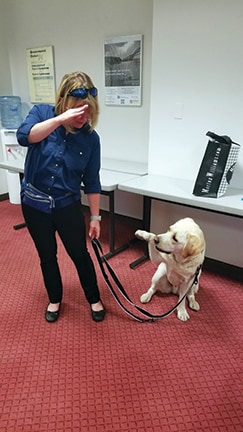Member Story
A Message from Dr. John Howard, Administrator of the WTC Health Program

This year’s newsletter comes at a time of continued growth in the World Trade Center (WTC) Health Program. Eighteen years later, there is no doubt that 9/11 continues to affect the long-term health of responders and survivors. This impact is demonstrated by the Program quickly approaching a 100,000 member milestone.
Additionally, in the last year alone:
- Applications to enroll in the Program are up over 8%;
- 4,988 Survivors and 4,210 Responders have enrolled;
- 41,115 members received medical monitoring; and
- 31,682 members received treatment.
We have responded to this demand with increased capacity at the clinics, improved response times, and additional staff to optimize operations. Our Clinical Centers of Excellence and Nationwide Provider Network have also streamlined care coordination and case management services to better serve you. Furthermore, Program-funded research into 9/11 health continues to answer important scientific questions that help enhance your care.
I hope you enjoy the stories, health tips, news, and reminders included in this newsletter. As Administrator, I am proud to serve our growing membership and ensure that the WTC Health Program provides you with the best medical monitoring and medical treatment for WTC-related health conditions well into the future.
In health,
John Howard, M.D.
WTC Health Program at a Glance
Total Members
New Members Last 12 Months
Data are current as of June 30, 2019. See more WTC Health Program statistics.
News & Highlights
Pharmacy Benefit Changes
- Beginning this October, up to a 30-day supply of medication will be allowed when filling a WTC-related prescription at a retail or community pharmacy. To receive a 30 to 90-day supply of medication, please enroll in the WTC Health Program’s home delivery service through OptumRx. The new OptumRx home delivery website for Program members is wtchomedelivery.optum.com. For more information on this policy change, please visit www.cdc.gov/wtc/pharmacy.html.
- The WTC Health Program no longer covers over-the-counter (OTC) products such as cold medicines, vitamins, and bandages as of December 2018. There are some exceptions to this policy, including some nasal, allergy, smoking cessation, asthma-related, and diabetes-related products. For items no longer covered, you should use your primary health insurance or pay out-of-pocket. More information is available at www.cdc.gov/wtc/pharmacy.html.
September 11th Victim Compensation Fund Update
As a reminder, the September 11th Victim Compensation Fund (VCF) is a completely separate program from the WTC Health Program, and is run by a different federal agency—the Department of Justice. The VCF’s claim filing deadline was extended to October 1, 2090, with the signing of the Never Forget the Heroes: James Zadroga, Ray Pfeifer, and Luis Alvarez Permanent Authorization of the September 11th Victim Compensation Fund Act on July 29, 2019. If you have not yet registered with the VCF, you should do that now, as registration deadlines vary based on individual circumstances. Registration requires only basic contact information and simply preserves your right to file a claim in the future.
Please note that no WTC Health Program staff, including the Clinical Centers of Excellence and the Nationwide Provider Network, have any access to VCF records nor authority to make medical decisions based on a VCF claim. For more information on the VCF visit www.vcf.gov or call the VCF Helpline at 1-855-885-1555. All VCF questions should be directed to the VCF.
Follow us: Get the latest in Program news, updates, health tips, resources, and events on Facebook and Twitter.
Facebook: Search @WTCHealthProgram or visit facebook.com/WTCHealthProgram
Twitter: Follow @WTCHealthPrgm or visit twitter.com/WTCHealthPrgm
Research to Care
Studying the health effects of 9/11
Did you know the WTC Health Program’s mission goes beyond medical monitoring and treatment? While much is now known about the health effects of 9/11, there is still much more to learn. That is why the WTC Health Program sponsors ongoing 9/11 health-related research as part of our core mission.
The WTC Health Program researches these broad areas:
- Physical and mental health conditions that may be related to the 9/11 terrorist attacks;
- Diagnosing WTC-related health conditions; and
- Treating WTC-related health conditions.
Since the start of 2011, the WTC Health Program has funded 77 research projects. Studies are conducted by a network of researchers at medical colleges, public health organizations, Data Centers, and Clinical Centers of Excellence (CCE). Topics range from obstructive sleep apnea to kidney disease to improving lung cancer screenings. The WTC Health Program also financially supports the WTC Health Registry and its work as part of the Program’s responsibilities outlined in the James Zadroga 9/11 Health and Compensation Act of 2010.
At the heart of our research is the “Research-to-Care” model. This means that our 9/11 health research draws upon all of the information and data available to us to improve monitoring and treatment services through the Program. It also helps us determine if new conditions can be added to the List of WTC-Related Health Conditions, and improves the response for future disasters.
How can you participate? For members in the NY metropolitan area, when you come in for an exam, your CCE will ask if they can add your medical information to the data which researchers are using to understand 9/11 health effects. Participation is optional and any information collected is maintained in accordance with strict requirements for privacy and confidentiality. You will receive your exam and continue to receive treatment even if you do not agree to share medical information for research purposes.
-
36Research projects funded by the WTC Health Program currently underway.
-
77Multi-year WTC Health Program research projects since 2011.
-
108Publications resulting from WTC Health Registry research projects. WTC Health Program funding supports WTC Health Registry research.
-
232Publications resulting from WTC Health Program Data Center research (from FDNY, General Responder Data Center, and Survivor Data Center), also supported by WTC Health Program funding.
It Takes a Team - A Helping Paw
by Laura Smith, LSW - WTC Health Program at Rutgers
In 2018, the Rutgers Clinical Center of Excellence (CCE) partnered with Puppies Behind Bars to provide qualifying WTC Health Program members with mental health service dogs. Puppies Behind Bars is a non-profit organization that trains prison inmates to raise service dogs for veterans and first responders diagnosed with Post-Traumatic Stress Disorder (PTSD).
Founded by Gloria Gilbert Stoga and Nora Moran, Puppies Behind Bars pairs highly trained canines with WTC Health Program members to provide mental health support and increased independence. All puppies are trained from the age of eight weeks to 24 months, and know more than 90 service commands by the time their training is complete.
PTSD is one of the top ten certified conditions in the WTC Health Program. Over 10,000 WTC Health Program members are certified for PTSD as a result of their involvement on or after 9/11. The main treatments for PTSD are medications and psychotherapy. Because PTSD affects people differently, a treatment that works for one person may not work for another. Puppies Behind Bars provides a complementary path to traditional treatment, since research shows that a combination of therapies may be effective in treating PTSD.
WTC Health Program members who apply for and are chosen to receive a dog from Puppies Behind Bars attend a 14-day workshop in upstate New York to learn how to work and bond with their animals. Thanks to the generosity of Puppies Behind Bars, $40,000 is invested by the non-profit per dog by the time they are paired with their best friend.
The Rutgers CCE is grateful to have partnered with the team at Puppies Behind Bars. Since their first presentation to our patients in 2018, three WTC Health Program members have successfully been matched with and taken home a service dog of their own. The Rutgers CCE will continue to partner with Puppies Behind Bars annually to improve the lives of our patients.
Note: Puppies Behind Bars covers the cost for this CCE program. The WTC Health Program does not cover support animals.

Member Story
Jimmy had peace of mind with his decision to move to Florida because he knew he could continue to receive the care he needed for his WTC-related mental health conditions through the WTC Health Program’s Nationwide Provider Network (NPN), managed by Logistics Health Inc. (LHI). “LHI made it that much easier for me… I was having some issues from my post-traumatic stress disorder condition (PTSD), and there was always a friendly voice on the end of the phone, willing to do whatever it took to make me smile.” Jimmy hopes his move to a warmer climate in Florida will result in potential medical benefits—particularly not being reminded of 9/11 each day.
NPN case managers work with members to get them the care they need, and Jimmy benefited from this relationship. He says his case manager was able to work quickly and efficiently. “When I was struggling with PTSD symptoms…not only was I able to get the help that I needed, I knew [I was] actually speaking to someone who really cares.” In Jimmy’s experience, his case manager “always puts the members first in their time of desperate need.”
The Nationwide Provider Network aims to provide the same convenient, compassionate, and comprehensive care available at the WTC Health Program CCEs in the New York metropolitan area. This benefits all WTC Health Program members across the country.
As Jimmy says, “Through the program I have been able to maintain my lifestyle which, in turn, has eased a lot of my day-to-day pain, mental anguish, and trauma that my mind and body had experienced on that horrible day.”
More about the Nationwide Provider Network
Jimmy, along with thousands of other WTC responders and survivors who live outside of the New York metropolitan area, as well as responders from the Pentagon and Shanksville, Pennsylvania sites, receive WTC Health Program benefits near their homes through the NPN.
The NPN is a network of providers managed by LHI. Providers are located in all 50 states. The NPN has been providing care to members since the WTC Health Program was launched in 2011, previously serving the 9/11 population as the National Responder Health Program. Members in the NPN receive the same medical and mental health benefits that they would be eligible for in New York. Eligible members still receive medical monitoring appointments, see specialists to diagnose and treat conditions, and receive treatment for any certified WTC-related conditions. The NPN will find members care within 30 miles of their urban residence, or within 70 miles for more rural areas.
If you would like to learn more about the NPN, the location of local providers or the types of benefits for which you may be eligible, please contact the NPN directly at WTCHPNPN@Logisticshealth.com.
A special thank you to Theodore L. Aquino, DO, MBA, MSPH, Medical Director at LHI for contributing to this article and Teresa Schlintz, social worker at LHI, for conducting the member interview with Mr. McQuade.
Spotlight on 9/11 Health: Nutrition
by Kathryn Hughes and Amanda Reichardt, Registered Dietitian Nutritionists, State University of New York at Stony Brook

In addition to annual monitoring exams and medical treatment for certified conditions, nutrition has taken on a key role at the State University of New York (SUNY) Stony Brook Clinical Center of Excellence. In August 2018, two Registered Dietitian Nutritionists joined the SUNY staff to help members lose weight and feel better by taking a wellness approach to treating many WTC-related diseases.
Last year, the top five certified conditions were chronic rhinosinusitis (inflammation of the sinus and nasal cavity), gastroesophageal reflux disease (GERD), asthma, sleep apnea, and cancer. Each of these conditions has a link to inflammation, a naturally occurring process that affects the body. Over time, too much inflammation can damage the heart, lungs, and other vital organs.
So how can inflammation be reduced? Through food! Eating an anti-inflammatory diet—one that is rich in plants and lean proteins—can help your overall health, especially if you are dealing with WTC-related illnesses.
Here are some suggestions to get you started:
-
Eat brightly colored fruits and vegetables.
The various colors represent different “phytochemicals,” which support a healthy immune system, reduce inflammation, and may slow the growth rate of cancer cells.
-
Consume plenty of Vitamin C-rich foods.
Vitamin C-rich foods include broccoli, red bell peppers, and oranges. Some evidence suggests that a high intake of vitamin C can improve lung function.
-
Aim to include one source of fermented foods daily.
This includes foods that are rich in probiotics like yogurt, sauerkraut, and apple cider vinegar. Persistent inflammation of the sinus can potentially alter gut bacteria in a negative way. Eating fermented foods can keep your gut happy, improve digestion, and reduce inflammation.
-
Consume other sources of phytochemicals that includes olive oil and whole grains - in addition to fruits and vegetables.
Consuming these foods and beverages in moderation has been shown to reduce inflammation, especially in those with PTSD.
-
Choose plant-based or other lean proteins (fish and poultry).
Lean proteins like beans, nuts, tofu, fish and poultry are better choices than less healthy meat options like beef or pork. Eating fatty fish like tuna or salmon twice per week can help increase the amount of healthy fats in your diet.
Make a healthy lifestyle your goal year-round! Focus on eating more vegetables, going for a walk after dinner, trying a new fermented food, or switching out fattier cuts of meat for lean ones. It is all about finding a solution that works for you!
References
Ash, Michael. Vitamin C Shows Direct Benefit in Lung Function. Clinical Education. Jan 29 2015. https://www.clinicaleducation.org/resources/abstracts/vitamin-c-shows-direct-benefit-in-lung-function/
Dobrosielski, D. et al. Diet and exercise in the management of obstructive sleep
apnea and cardiovascular disease risk. Eur Respir Rev. 2017; 26(144).
Nayan, S. et al. Dietary modifications for refractory chronic rhinosinusitis?
Manipulating diet for the modulation of inflammation. Am J Rhinol Allergy.
2015; 29:1704.
Phytochemicals: The Cancer Fights in Your Food. American Institute for Cancer Research Web site. Published 2019.
Accessed March 2019. https://www.aicr.org/reduce-your-cancer-risk/diet/elements_phytochemicals.html
Richard, C. et al. Effect of the Mediterranean Diet with and Without Weight Loss on Markers
of Inflammation in Men with Metabolic Syndrome. Obesity. 2013; (21)51-57.

Roast the Rainbow Vegetables
Recipe by Kathryn Hughes, RDN
Ingredients:
- 2 medium sweet potatoes with skin, diced into 1 inch cubes. Microwave for 3 minutes to soften.
- 1 crown of broccoli, chopped into small florets
- 3 large carrots, peeled and diced into 1 inch coins. Microwave for 3 minutes to soften.
- 1 yellow bell pepper, diced into 1 inch pieces
- 1 red onion, sliced
- 1 tbsp of extra-virgin olive oil
- ½ tbsp garlic powder
- ½ tbsp dried oregano
- ½ tbsp rosemary
- 1 tsp salt and pepper (or to taste)
Directions:
- Pre-heat oven to 400F.
- Once vegetables are washed and cut and the sweet potatoes and carrots have been microwaved, place them on a large baking sheet lined with parchment paper.
- Drizzle olive oil over the vegetables then add seasonings. Toss to coat, making sure all pieces are coated.
- Roast in the oven for 20 minutes. Toss, then place back in the oven for another 10 minutes or until desired crispness.
- Let cool slightly, then serve as a side dish to your favorite meal and enjoy!
What Can Case Management Do for You?
The WTC Health Program is proud to offer case management services to members that need assistance coordinating care. In 2018, the WTC Health Program simplified program operations by bringing case management services to those who know you best – our healthcare partners at the Clinical Centers of Excellence (CCE) and the Nationwide Provider Network (NPN). Case managers can help you learn more about your certified condition and make better choices about your healthcare.
Case managers at the CCE/NPN help members manage their complex care needs. The case management team is made up of the many individuals involved in a member’s care. This could include doctors, nurse practitioners, nurses, social workers, care coordinators, and CCE/NPN support staff. The member’s family or caregiver may also be part of the case management team, as they can play an important role in caring for the member.
Case managers ensure that members receive the best possible care by focusing on each member’s unique physical, emotional, and financial needs. Case managers can help members understand their available care options, while developing a plan of care specific to their individual needs. This may include helping members to identify providers, locate healthcare facilities, address pharmacy concerns, assist with billing inquiries, and obtain authorizations for specialty care.
If you need case management services, know that our case managers are just a phone call away! Reach out to your Clinical Center of Excellence or the Nationwide Provider Network to see what a case manager can do for you.
Latency Period and WTC-Related Cancer
The WTC Health Program provides treatment for a specific list of cancers. The official List of WTC- Related Health Conditions (List) is established in regulations and includes cancers that could be related to 9/11 toxic exposures. The List is based on scientific studies that supported a link between certain cancers and 9/11 toxic exposure. If you are diagnosed with a cancer, then your WTC Health Program provider will help determine whether your cancer may be related to your 9/11 exposure.
Part of this evaluation looks at the time delay between initial toxic exposure and cancer diagnosis. This is known as the cancer latency period. All cancers have a latency period, and different types of cancer have different latency periods since each type of cancer grows at a different rate. For example, mesothelioma takes more than a decade to grow after toxic exposure, whereas blood type cancers may occur more rapidly.
Based on the best available scientific evidence, the WTC Health Program has determined the shortest allowable cancer latency period for each type of cancer covered by the Program. Any cancer certified for treatment in the Program must meet this cancer latency period, in addition to any other certification requirements. A cancer diagnosed earlier than this minimum latency period cannot be certified and will not qualify for treatment. In other words, if your cancer does not meet the minimum latency requirement as set by the WTC Health Program, your WTC Health Program provider cannot request certification of your cancer. There are no exceptions.
Please remember that the WTC Health Program offers no-cost cancer screening to eligible members. Speak to your WTC Health Program provider today to discuss your eligibility for cancer screening.

Here for You
Member Service and Outreach
Who do I call when I have questions about...?
- Enrollment
- Certifications
- Appeals
- Denials
- Program Benefits
- Program Policies
- Scheduling appointments
- Care and treatment
- Medications
- Provider authorizations
- Case management
- Clinic transfers
- Pharmacy benefits
- Issues filling your prescriptions
- Home delivery service
We Want to Stay in Touch!
If you have moved or are planning to move, please let us know right away. Call 1-888-982-4748 to update your contact information with the WTC Health Program to be sure you receive important news and updates related to Program benefits. Don’t forget to let your Clinical Center of Excellence know too!
Designated Representative Forms Now Online.
Do you want to designate someone else to represent your interests in the WTC Health Program? This is known as a designated representative. The Program only allows you to have one at a time, and requires that you and your designated representative complete a Designated Representative Form and a Designated Representative HIPAA release. Learn more at www.cdc.gov/wtc/designated_representative.html
Responders and Certified-Eligible Survivors: Don’t put off your monitoring exam!
Yearly monitoring exams are an important part of your healthcare. A thorough exam can help find any changes in your health that you might not be aware of and that may be corrected or slowed with early treatment. Regular exams also give tremendous peace of mind. Contact your Clinical Center of Excellence or Nationwide Provider Network provider to schedule!
Do you know your Rights and Responsibilities as a Member?
Visit www.cdc.gov/wtc/handbook.html#rights
New Outreach and Education Partner: Hispanic Federation
Welcome to the newest outreach and education partner, the Hispanic Federation! The Hispanic Federation is a nonprofit organization that supports and advocates for Hispanic communities, and is engaging the Latino community throughout New York City with both English and Spanish events, materials, and public service announcements.
The Hispanic Federation joins 9/11 Environmental Action in reaching out to survivors. Responder outreach is currently performed by the New York Committee for Occupational Safety and Health (NYCOSH) and the FealGood Foundation. Outreach is also performed by staff at the Clinical Centers of Excellence. Learn more about the WTC Health Program’s outreach and education partners at www.cdc.gov/wtc/outreach.html

 This webpage is archived for historical purposes and is no longer being maintained or updated. Please use the search bar to find more recent information.
This webpage is archived for historical purposes and is no longer being maintained or updated. Please use the search bar to find more recent information. 
